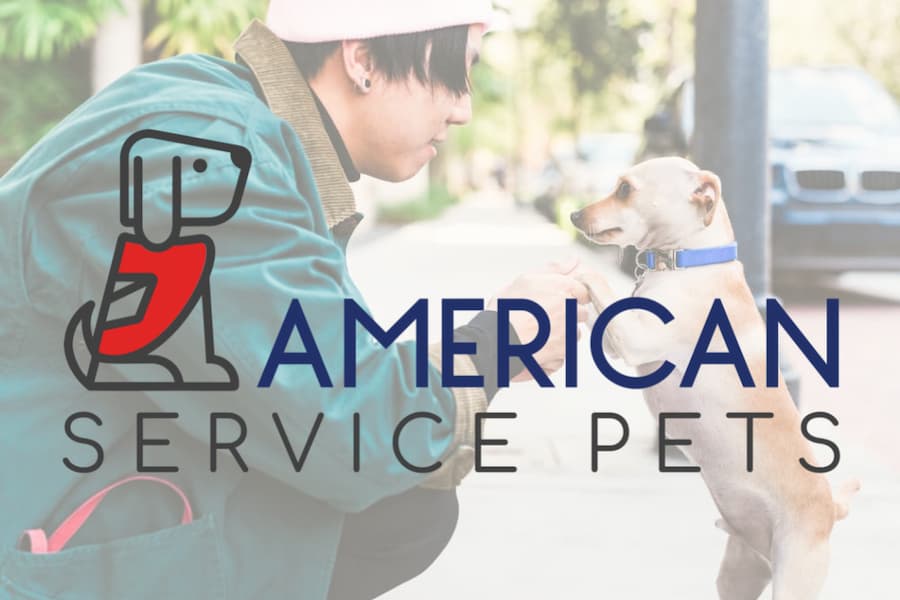How to Get Your Emotional Support Animal Certification
in Nevada

Everyone needs a little help sometimes, and a furry friend is an excellent source of relief. This is even more true for people managing the symptoms of emotional disorders. An Emotional Support Animal (ESA) helps its owners through these emotionally demanding times.
These special animals provide comfort and support when signs of their owner’s emotional or sensory disorders appear. There are state and federal laws to protect them in certain instances, but there’s also some public resistance. That’s why recognizing these animals for their vital health benefits is so important.
Finding pet-friendly rental housing and other establishments in Nevada isn’t always easy. Landlords and business owners can be sticklers regarding pet rules, regardless of their accepted therapeutic incentives. Tenants may deal with eviction and correlating costs without appropriate documentation for their ESA, and business owners can also deny admittance.
The Fair Housing Act allows people with emotional disorders to house a support animal in their rental unit if the owner has a Nevada ESA letter. American Service Pets can help them get that authorization. Find out if you qualify now.
The Benefits Of Having An Emotional Support Animal
Most Emotional Support Animals are dogs because they’re highly trainable, but ESAs can be any species that brings relief in problematic situations. Miniature horses can qualify as comfort animals in Nevada too. ESAs provide a slew of rewards, including:
Genuine Support & Comfort
ESAs deliver the sense of serenity and safety essential to make it through uncomfortable moments. Mingling with animals can help remove overpowering stress from daily problems.
Relief From Loneliness
Support animals successfully combat loneliness and increase the happiness hormones, dopamine, serotonin, and oxytocin, according to the National Institutes of Health. They are also a guaranteed way to start conversations and meet people when visiting Nevada’s pet-friendly establishments.
Holistic Medicine
Pharmaceutical medication is typically how people treat symptoms of emotional disorders, such as anxiety and panic attacks, but comfort animals are also recognized as an effective treatment. ESAs work as a holistic medicine by boosting mood, offering reassurance, and assuaging loneliness without medications.
Physical Rehabilitation
People recovering from physical ailments, such as heart attacks, addiction, stroke, or severe injury, can find a loyal support system in their ESA during the healing process. They boost morale and keep you entertained.
American Service Pets helps pet owners coping with emotional issues register for theirs.
Find out if you qualify for a Nevada ESA letter today.
Nevada ESA Laws
ESAs provide security, comfort, and camaraderie but aren’t trained to perform lifesaving duties, such as sense blood sugar levels dropping, alert to a seizure, or divert a panic attack. Official service and Psychiatric Service Animals are the only animals professionally trained to provide these focused services.
The different duties of these animals provide their owners separate legal freedoms. Here are some fundamental Nevada laws:
Housing Laws
The Federal Fair Housing Act and Nevada housing laws forbid landlords from evicting any renter because they own a support animal. They can’t call for a pet deposit or impose extra charges on any renter with an ESA.
Landlords have the legal right to view the authorized ESA letter and ask what service the animal provides. They may not, however, inquire about the nature of the disability or any related symptoms. Landlords also have the right to turn away tenants if their comfort animal is destructive, not house-trained, or causes a financial burden on the landlord.


Public Places
Nevada business owners make their own rulings concerning ESAs in their establishments. There’s no law requiring business owners to consent to these animals as there is with landlords. Comfort animals are allowed access to any establishment that allows pets, including:
- Beaches
- Malls
- Theaters
- Tourist attractions
- Restaurants
- Grocery stores
Calling ahead before you visit with your qualified animal is a smart idea. Understand the rules before you go to help prevent any upsetting circumstances.
Workplace Laws
Nevada law doesn’t force employers to allow Emotional Support Animals in their establishment. Obtaining an official ESA letter approved by a licensed Nevada therapist can be the defining factor with a compassionate employer. It helps if the ESA is quiet, small, and house-trained.


Travel Laws
The Department of Transportation changed its formal travel guidelines in 2020 to revoke the right to an ESA in-cabin without payment. Airlines thus make their own rules involving in-cabin support animals, and most apply standard pet rules to them. A safe plan would be to check with the airline, so you know before you reach the airport.
Nevada doesn’t grant ESAs access to public transportation, which includes:
- Buses
- Subways
- Rideshare apps
- Railcars
- Trams
Nevada Emotional Support Animals are allowed to stay in their owners’ homes, a right many residents consider the most important. American Service Pets has helped many Nevadans validate the status of their ESA.
FAQ
The Basics
Yes, Nevada has its own set of laws in addition to following the federal Americans with Disabilities Act (ADA).
The definition of service animal is virtually the same in Nevada as it is under federal ADA law. A service animal is defined as “a dog and/or a miniature horse that is individually trained to do work or perform tasks for a person with a disability.” In addition to guide/seeing-eye dogs and hearing dogs, the service animal category also includes psychiatric service animals, seizure alert animals, and allergen alert animals.
Disability is defined as a physical, cognitive, or mental impairment which substantially limts one or more major life activities.
Dogs and miniature horses are the only animals that qualify as service animals.
The Nevada Code on Public Welfare says that fraudulent misrepresentation of an animal as a service animal or a service animal in training is unlawful. This is considered a misdemeanor in the state of Nevada and is punishable by a fine of up to $500.
Yes, state laws cover both dogs and miniature horses that are training to be service animals.
Neither the ADA nor Nevada law cover emotional support animals because they are not trained to perform specific tasks.
FAQ
Public Accommodations & Travel with a Service Animal
Nevada’s definition of public accommodations is very broad, including hotels and other lodging establishments, restaurants, theaters, stadiums, stores, professional offices, hospitals, funeral parlors, zoos, schools, daycare centers, food banks, senior centers, homeless shelters, golf courses, and any other place where the public is invited. The ADA definition of public accommodations is similarly broad.
Under Nevada law, public establishments may only ask whether the animal is a service animal or a service animal in training and what task(s) the animal has been trained to perform.
Service animals may be excluded or removed from public accommodations if they are not housebroken, out of control, or posing a direct threat to the health and safety of others.
Both the ADA and state law prohibit discrimination against people with disabilities on public transportation, which includes transportation by bus, rail, or other vehicles such as vans and cabs. It is important to note that air travel and public school transportation are regulated separately. State law also covers indiviuals with service animals on private transportation such as privately owned taxicab companies and bus services.
There are no required vests, tags, or documentation that you must have with you or your animal. However, a dog license and/or rabies tag may be necessary for any animal regardless of service animal status if required by state or local law.
Under Nevada law, it is unlawful for an employer to refuse to permit an employee with a disability to keep a service animal with him at work. However, in order to do so, the employee is expected to file a request for a reasonable accommodation. The only way this request can be denied is if it would be considered unreasonable to comply. For example, an individual requesting to have a miniature horse in an office setting could have their request deemed unreasonable.
Yes, Nevada law allows for service animals in publicly trafficked areas of medical facilities.
Nevada law states that anyone who interferes with a service animal or its handler is guilty of a gross misdemanor. They can be subject to civil penalties (or criminal depending on the level of interference) and made to pay punitive damages to the person who has been discriminated against.
Nevada follows the Air Carrier Access Act (ACAA), which defines a service animal as a dog (regardless of breed or size) trained to do work or perform tasks to assist a qualified individual with a diability, and may include psychiatric service dogs. Minature horses are excluded in this definition.
Airlines can require a passenger to provide a U.S. Department of Transportation (DOT) form attesting to the animal’s health, behavior, and training and a U.S. DOT form attesting that the animal can either not relieve itself or can relieve itself in a sanitary manner (if the animal will be on a flight that is 8 or more hours).
The ACAA does not address service animals in-training, so airlines are not required to carry them as they do not meet the requirements of an ACAA-defined service animal. However, airlines can make their own individual policies.
FAQ
Housing Law
Individuals with assistance animals may request what the law calls an accommodation. This is simply asking for an exception to a housing establishment’s “no pets” policy. The accommodation request must be for a person who has a physical or mental disability, and the person must have a disability-related need for an assistance animal.
A landlord cannot ask for medical records or detailed documentation of a person’s disability. However, they may ask for proof that an animal assists, supports, or provides services to a tenant. This proof can be shown by a statement from a healthcare provider that “the animal performs a function that ameliorates the effects of the person’s disability.”
Yes. While you cannot be charged “pet rent,” you may be subject to fees for any damages your animal causes.
The FHA extends protections to “assistance animals” in addition to service animals. This category includes emotional support animals, and it is not limited to dogs only.
FAQ
Discrimination Complaints
For public accommodations-related discrimination, you can file a complaint with the Nevada Equal Rights Commission (NERC) within 300 days of the alleged discriminatory incident. Employment complaints should be filed within 180 days to the NERC or the U.S. Equal Employment Opportunity Commission (EEOC). If you have been discriminated against on public transportation, you can file a complaint directly with the transportation agency. You can also file an administrative complaint within 180 days to the NERC, the Federal Transit Authority or the Department of Justice.
You can file a housing complaint with the Nevada Equal Rights Commission (NERC), so long as you do it within 300 days of the discriminatory conduct. You can also file directly with Nevada’s regional office of the U.S. Department of Housing and Urban Development (HUD).
How to Obtain an Emotional Support Animal Certification Letter in Nevada
American Service Pets believes owners have the right to enjoy the benefits of an ESA, so we’ve simplified the qualification process. Here’s how to do it:
Fill Out the Questionnaire
It takes approximately three minutes to answer the American Service Pets questionnaire to determine your eligibility.
Get a Doctor’s Approval
We help you submit your file to a licensed, state-approved doctor or other licensed mental health provider for authorization. Doctors are always available, and most requests are approved within minutes. Letters are emailed immediately.
Add Your Pet to the International Directory
Your pet gets an online profile on the national directory that shows its status and ESA letter for public view.
American Service Pets has assisted in qualifying over 45,000 pet owners nationwide. As many as 95% of applicants are eligible for Nevada ESA approval letters. See if you qualify in just a few minutes.
Benefits of American Service Pets
American Service Pets assists applicants in getting the documentation they need for their Emotional Support Animal. Here are some key aspects that make us a good choice in Nevada:
- All-in-one solution for approving Emotional Support Animals
- Free qualification questionnaire
- No prescription required
- Chance to connect with a licensed healthcare professional in your state
- Official letters are accepted nationwide

Now is your chance to secure the physical and psychological rights of owning your ESA. An official ESA letter will legalize your therapeutic relationship.
Allow Us to Help Get Your ESA Approved
Gaining legal approval for your ESA is a fabulous feeling, but not everyone shares your happiness. Encourage resistant landlords and others to understand this vital connection with an ESA letter. Answer the five questions on our questionnaire today and you’ll be on your way to getting qualified — usually on the same day — for an Emotional Support Animal in Nevada.
Disclaimer: We would like to emphasize that while the terms “certification” or “registration” may be used in relation to Emotional Support Animals, there is no official certification process for ESAs or any form of ESA registry as of this date. As such, the use of these terms should not be interpreted as legally recognized designations by government or regulatory authorities. Remember, ESAs can provide a valuable source of comfort and support, but their recognition relies on proper documentation from a healthcare professional and adherence to relevant laws and guidelines.

